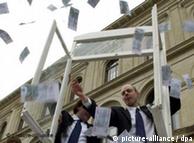 | US Senate approves Wall Street bailout bill
The US Senate has passed a new version of the 700-billion-dollar Wall Street bailout bill by a vote of 74-25. Senate majority leader Harry Reid said the bill was not just aimed at helping Wall Street but all of America. The bill allows the government to buy the bad assets of banks, which are believed to be the root of the financial crisis. The legislation also includes tax breaks for businesses, the energy sector, middle-income earners, and an increase in bank deposit insurance. The US House of Representatives, which rejected the original bill earlier this week, is now expected to vote on the measure on Friday. |  |  | EU splits ahead of Finance summit
France has invited the leaders of Europe's four biggest economies to an emergency meeting to address the global financial crisis. The leaders of Germany, Britain, France and Italy are to meet in Paris on Saturday to agree on a response to the problem. The announcement comes amid signs of disagreement between Germany, Europe's largest economy, and France, which holds the European Union's rotating presidency. German Finance Minister Peer Steinbrück rejected the idea of a major rescue package for European banks, after his French counterpart floated the proposal in a German newspaper. |  |  | ECB keeps interest rates unchanged
The European Central Bank has kept its main lending rate steady at 4.25 percent, despite growing pressure from the international banking crisis and slumping eurozone economies. Worries that rising wages could stoke inflation helped convince ECB governors that the time was not yet ripe for a rate cut. The bank's president, Jean-Claude Trichet, said a cut was "considered", but rejected because it was still "crucial" to keep "inflation expectation in line." |  |  | Merkel and Medvedev discuss Georgia crisis
German Chancellor Angela Merkel has held talks with Russian President Dmitry Medvedev in St. Petersburg. The meeting, aimed at promoting closer economic and political ties, was overshadowed by tensions over Russia's war with Georgia. Merkel criticised Russia's response to the crisis in August as "disproportionate", but added that Europe and Moscow should now focus on building trust. Medvedev defended his country's actions and blamed Georgia for starting the war. |  |  | EU ceasefire mission starts smoothly
European observers say a ceasefire mission in Georgia has started smoothly. The head of the EU mission, Hansjoerg Haber, said monitors were allowed into Russian-controlled buffer zones around the breakaway regions of South Ossetia and Abkhazia. Russia initially warned that the monitors would be denied entry. Under the terms of a French-brokered ceasefire, Russia has agreed to withdraw troops from the buffer zones in Georgian territory by October 10, though Moscow says it will keep forces in the breakaway regions. It recognised them as independent states, after repelling a Georgian offensive to retake South Ossetia in August. |  |  | 19 killed in Baghdad twin suicide bombings
Suicide bombers have killed at least 19 people near two Shiite mosques in the Iraqi capital Baghdad as worshippers marked the end of the Ramadan fasting month. More than 30 others were wounded in the twin attacks. Police said a suicide bomber blew himself up in Jadida, a Shiite district, while another bomber rammed his explosives-filled car into an Iraqi military vehicle at a checkpoint in the neighbourhood of Zafaraniyah. Authorities had warned that militants might launch attacks during the festive season, one of the most important in the Muslim calendar. |  |  | Two Koreas trade barbs at border meeting
North and South Korea have held their first security talks since a conservative South Korean government took office in February. The 90-minute meeting was conducted between army colonels in the demilitarised zone between the two sides. The North demanded that South Korea stop activists from sending propaganda leaflets across the border, which attack its leader, Kim Jong Il. A South Korean delegate said the meeting served more to air current grievances than to resolve them. Meanwhile, top US nuclear negotiator, Christopher Hill, has extended his stay in the North Korean capital, in a bid to rescue a faltering aid-for-disarmament deal. |  |  | US Senate approves nuclear deal with India
The US Senate has overwhelmingly approved an agreement allowing the United States to sell civilian nuclear technology and material to India. The agreement, which still needs the signature of President Bush to become law, would allow US companies to compete for billions of dollars of contracts in India's lucrative energy sector. The move would overturn a three-decade ban on nuclear trade with India in return for safeguards and UN inspections of its civilian nuclear facilities. |  |  | Plane wreckage of adventurer Fosset found in California
Search teams have found the wreckage of a small plane in eastern California which appears to be the one piloted by millionaire adventurer Steve Fossett. The National Transportation Safety Board in the United States has confirmed the find. Fossett vanished in September 2007 after taking off from a private airstrip in Nevada. Pieces of clothing and ID cards belonging to Fossett were found by a hiker in the rugged mountains around Mammoth Lakes on Tuesday. There has been no mention of whether the bodily remains have been recovered. |  |  | |  |

